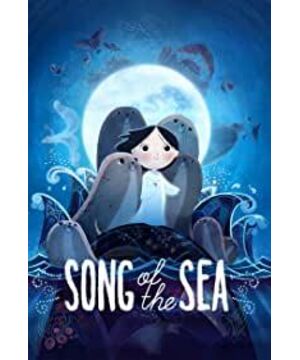n’t say more, just want to ask a few questions:
1. Why does Ben’s mother have to Going back to the sea?
Some people say that according to the legend: "When a man steals the skin of a seal spirit, she must become his wife. Once the seal spirit finds her skin, she will immediately return to her home in the sea." Really like the Cowherd and the Weaver Girl. It turns out that Chinese and foreign diaosi who can't marry a wife are very dirty and mean. However, since everyone says that people have love, let's treat it as love.
But why have to leave? This explanation is still unanswered. It is speculated by common sense that if he was forced to marry a clothes thief, after he found the clothes, the seal spirit who "loved Qiu Shan (the sea)" would of course go back. It's like no one would be happy after female college students were trafficked to the countryside. However, from the film, the mother seal loves men and children. She gives a reason: Only in this way can she save her children.
2. Then, why can you save the child by doing this? Must be born in the sea? It does not seem. His son was several years old at that time. Either boys can be born on land, and girls have to be born in the sea. Khan...
3. After giving birth, why didn't she leave it to her husband?
Speaking of it, Zhinv's husband also picked up the two babies, but Zhinv was forced. Her child is an ordinary person and can't go back with her, let alone Heavenly Court. The seal girl should know that her daughter is also a seal fairy. At the end, she was planning to take her daughter away. That being the case, why did you leave the child behind? If you don't want to see your husband sad, then why do you need to stage the take away scene later?
4. Why is Little Seal Fairy keen to make trouble for his brother?
The little boy is the most normal and cutest person in the film. I also drew a map very deliberately to take the bus to go home, who knew my sister had to get off halfway. I thought she had some magical powers and knew shortcuts, but as the little boy said, it was a dangerous road compared to a bus. The owl incident just happened before, but she wanted to blow the conch. After being stopped by her brother, the two of them lost their way and went to a holy well to rest.
In order to carry his sister, the elder brother was scratched on his leg, and the little girl picked leaves. I think she can finally understand the feelings of her brother. Unexpectedly, she jumped into the well in the next shot. The little boy who was happily planning his route home was also dragged in by the dog. Okay...At this time I thought again, maybe the right way is in the well-as a result, after going down, my sister was arrested soon, and my brother had to risk her to rescue her. What are you doing, boy bear! Just to advance the adventure story?
5. Why doesn't mother sing to save the elves but asks the children to sing?
Some people say that my mother doesn't sing because she still doesn't want to leave the world. However, according to the plot that follows, the seal girl needs to put on her jacket and sing to survive. The problem came again. So when Shelsa stayed at the lighthouse before, she didn't wear a coat or sing. How could she be all right? And my mother hasn't sang for so many years, so it's fine. Why pinch?
……
These questions linger in my mind, making me feel that although the whole picture is beautiful, it is not logically smooth.
——————————————————————————
Thank you for your reply. Although failed to convince me. However, I was relieved by chance when I saw an interview with Takahata Hoon:
Southern Weekend: You said in the book "The History of Animated Films" that the creation of animated films must be objective, and the audience and the protagonist must not be completely assimilated, and the audience must be given a sense of distance. , Let the audience think calmly.
Takahata Ho: Only let the audience observe the world from the protagonist's point of view, which is often the case in Japanese movies. There are many directors who can always take advantage of the audience's expectation of the protagonist to turn dangers into a breeze, to please them with this result and make them intoxicated. The same is true for Miyazaki.
It can be said that it is a great invention of Japanese animation to let the audience have a sense of substitution for the characters. Generally speaking, the world should be portrayed objectively. To be too sticky on the protagonist makes it difficult to see the whole world clearly. Japanese cartoons will only make people's hearts beat faster, but they can't make people feel anxious. This method of creation, I call it "substitutional emotional projection".
Southern Weekend: Give a specific example of "substitution"?
Takahata Hoon: For example, "Spirited Away". At the end of the film, Chihiro glanced at the pigs that were brought over and said, "My parents are not in them." The audience was delighted when they heard this sentence, knowing that Chihiro's parents had changed back into humans. But how did Chihiro find out? No one is going to pursue it, because the audience has become Chihiro's cheerleader, automatically filling in the plot, and completely devoid of critical spirit.
Southern Weekend: So your work will feel a little difficult to integrate into it?
Takahata Hoon: In any case, I am more inclined to the creative method of "considering emotional projection" rather than "substitution". You should shoot works that give the audience an objective perspective and allow the audience to maintain their judgment and rationality. To leave the side of objectivity, although a little cold, cold is necessary. It's not about letting the audience assimilate with the protagonist, but calmly understanding that although he is different from the protagonist, he can understand his emotions. I will not oppress the audience to "think this way" from the picture, I hope they will take the initiative to use their imagination and realize their emotional projection.
If you fit the protagonist too much, you will lose the angle of observation from the outside and lose your laughter. Therefore, for animated films, laughter is a very objective thing.
View more about Song of the Sea reviews










